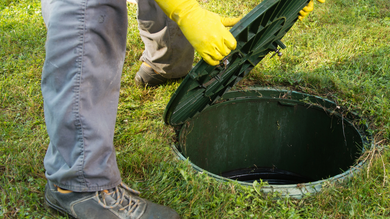Your septic tank system is probably not at the top of your home maintenance list. But like most things around the house, the more you check in and care for your septic system, the longer it will last and they less issues you will have down the line - saving you both time and money.
Signs of a problem
You may have a problem with your septic system when:
- There is a bad odour coming from your septic system
- Toilets and plugs drain very slowly
- Waste water is pooling on the drainage field
Causes
These problems can be caused by any one or more of the following factors:
- A sludge build up in the tank caused by infrequent emptying
- Non-biodegradable chemicals being put down the drains, killing the useful bacteria required to make your septic tank system work efficiently
- Other unsuitable items such as fats and grease are being disposed of into the system, this can clog the gravel in the disposal field
- There is damage to the pipes, either by tree roots or by fractures in the pipes
- The disposal field is water-logged (either through heavy rainfall or too much water going to the system at once e.g. shower/bath water and washing water)
Septic Tank Maintenance
To maintain and protect your septic tank system, we recommend the following:
- Clean (empty) your septic tank regularly, at least every three years
- If you have a waste-disposal unit for food scraps your septic tank should be cleaned out annually, as sludge will build up rapidly.
- Use only toilet cleaners and other detergents suitable for septic tank systems (i.e., avoid using and disposing of bleaches, whiteners, nappy soakers, stain removers & disinfectants (in large amounts) )
- Do not use disinfectants to clean the toilet bowl, as disinfectants will kill the useful bacteria in the tank
- Do not dispose of anything, other than water and system friendly detergents down drains (i.e., avoid disposing of baby wipes, cigarette butts, sanitary pads, tampons, disposable nappies, condoms in the toilet)
- Do not dispose of anything, other than water and system friendly detergents down drains (i.e., avoid disposal of grease, chemicals, pesticides and oils, paints, varnishes and paint thinners , cold water soap powders)
- Protect the drainage field by avoiding driving vehicles or grazing stock on it and divert storm-water away from the area.
- Do not allow deep rooting trees or shrubs to grow over the drainage pipes or the disposal area.

